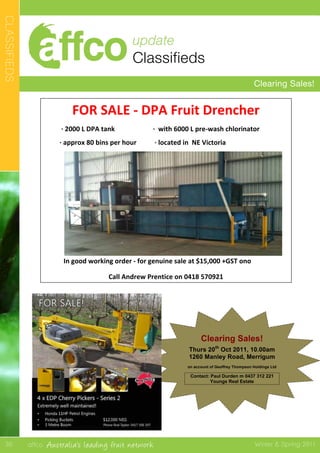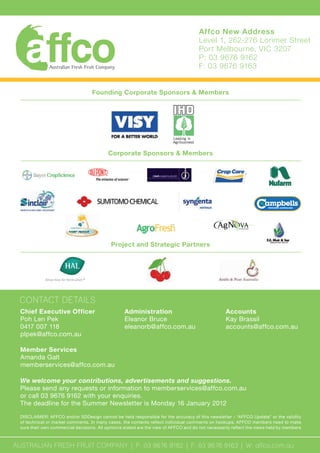The document provides an update from the CEO of the Australian Fresh Fruit Company (AFFCO) covering activities from May to September 2011. Some key points include:
- The success of AFFCO's recent leadership development programs and plans for future programs.
- The CEO's participation in industry events like Fresh Connections 2011 and efforts to coordinate opposition to New Zealand apple imports.
- Updates on projects like the Well-Informed Growers program and CherryNet stem retention project.
- Highlights of potential innovations like the Polynate bee pollinator and MAF Roda apple pre-sizer.
- Plans to continue providing members with updates on issues impacting the fruit industry through leadership programs
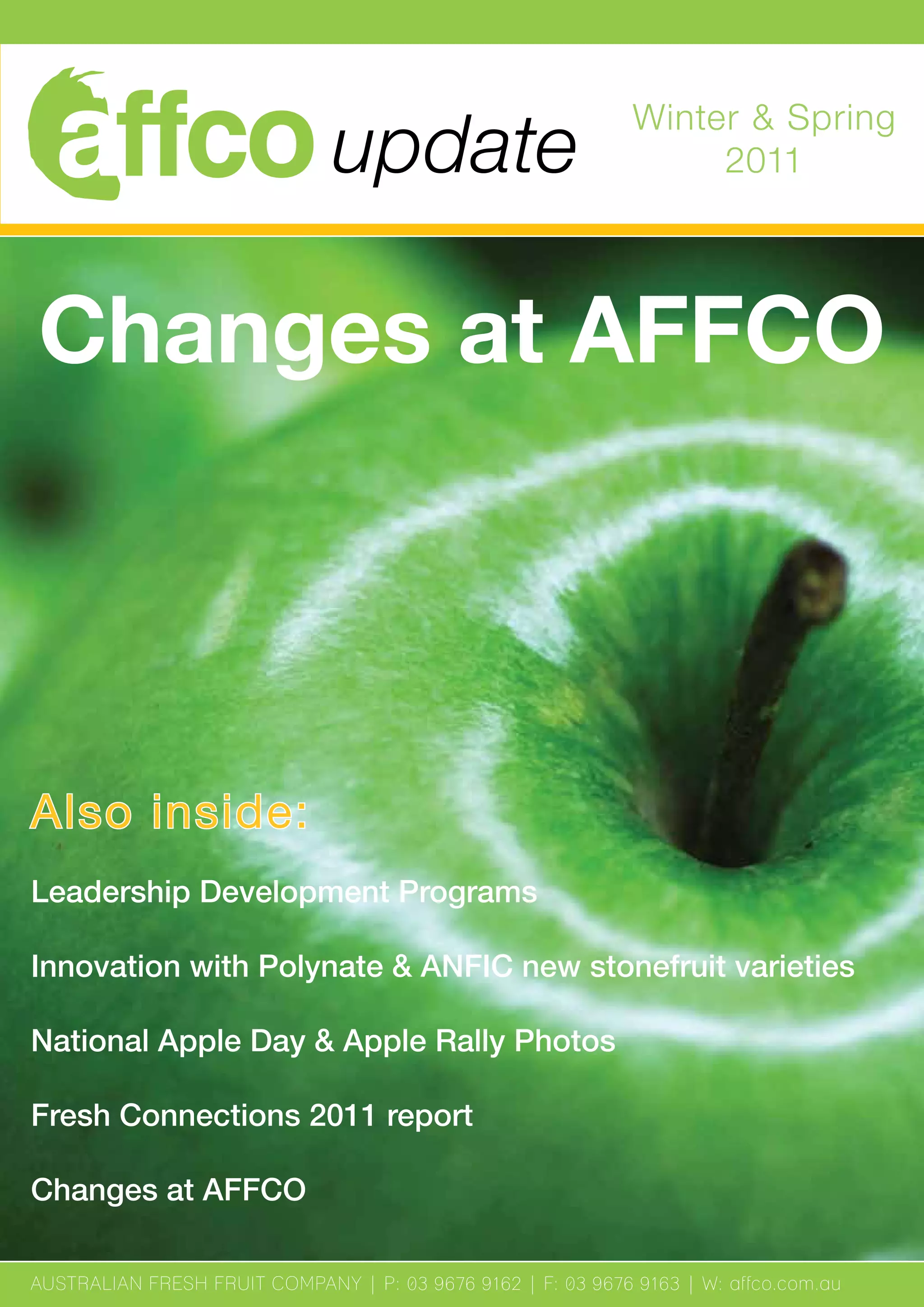
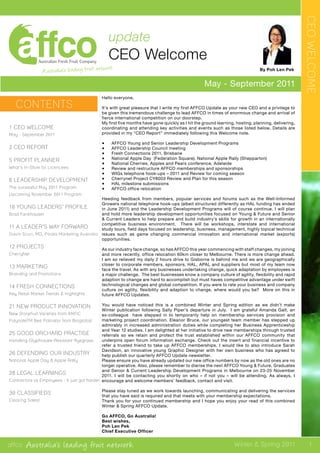
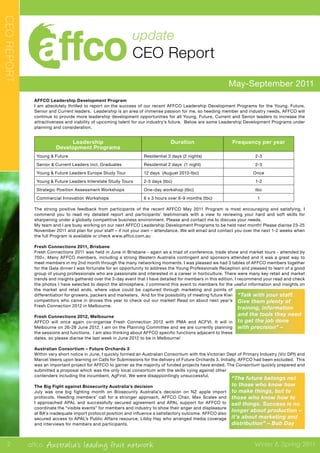
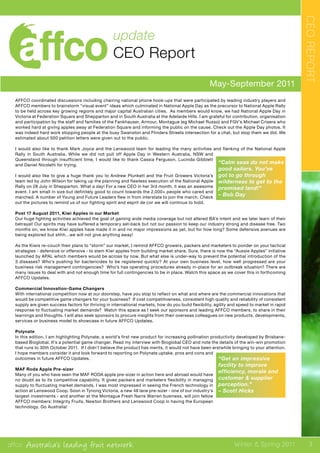
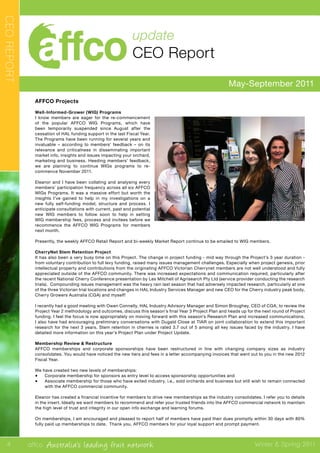
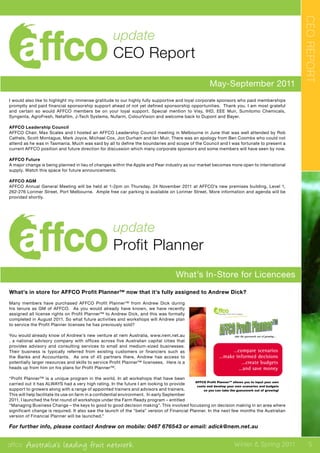
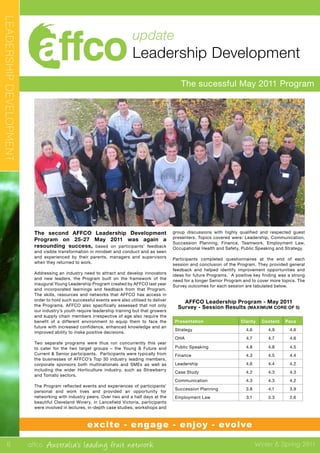
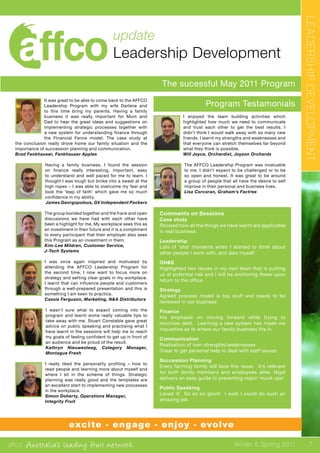
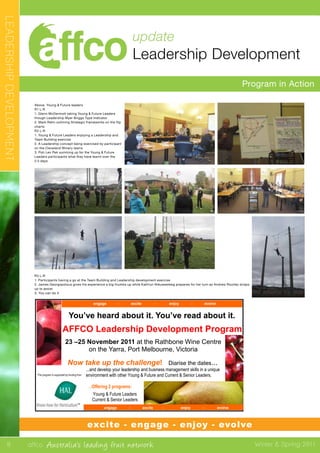
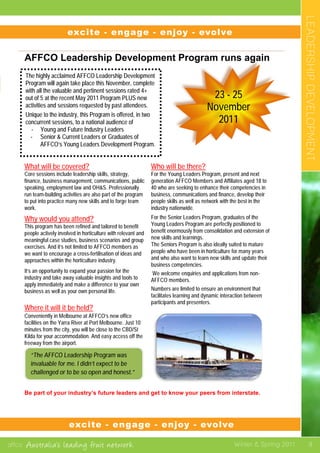
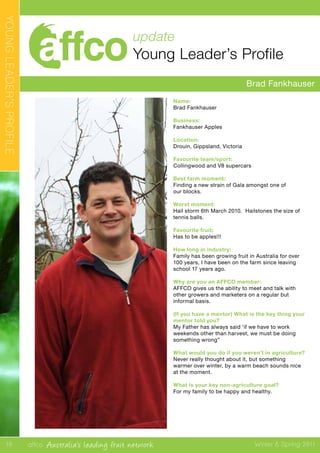
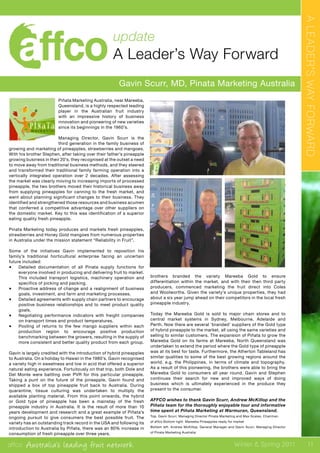
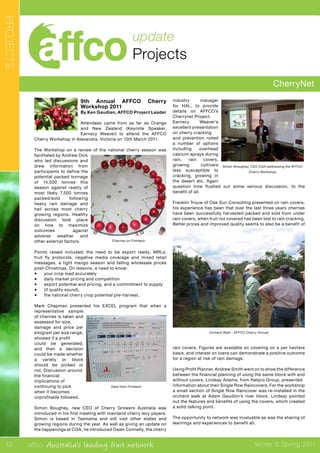
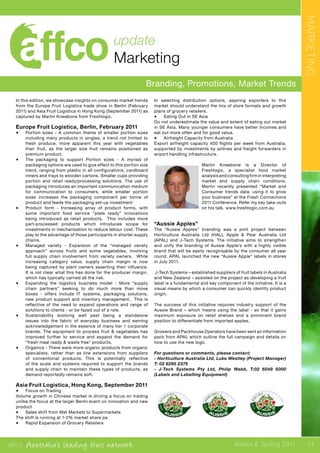
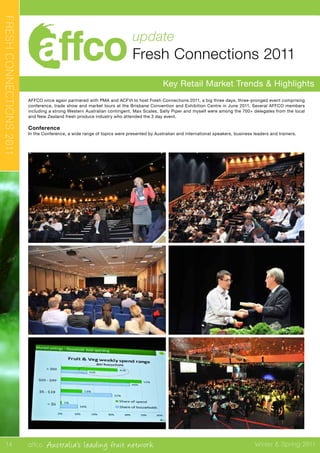
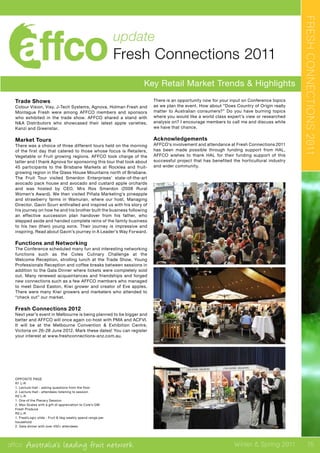
![affco Australia’s leading fruit network Winter & Spring 2011
update
Fresh Connections 2011
Key Retail Market Trends & Highlights | Conference
FRESHCONNECTIONS2011
Read my key out-takes for members on fresh produce retail
and market trend.
The importance of Independent Retailers in
today’s competitive retail environment
Lou Jardin, Managing Director, SPAR Australia
SPAR comprises ca. 300 independent retail supermarkets such
as SPAR and 5 Star banner groups in Queensland, New South
Wales, ACT, NT and Pacific Island areas. [PLP note: akin to
Foodworks with 650 supermarkets, food and convenience stores
nationally].
• SPAR’s two key points of differentiation to the big
retailers: Woolies, Coles and Metcash are they are family
run- businesses supporting other family-run businesses
with local offerings to support local producers and local
employment
• Successful supermarkets are good at fresh produce
and fresh is the key draw card to attract consumers into
supermarkets
• Today’s supermarket landscape is based on “Price War”
between the 3 retailers and market style presentation, i.e
Big Box model.
Market and Consumer Trends data: using it to
grow your business
Yahya Kanji, The Nielsen Company
• Trend in Fresh Produce last 12 months is value, not volume
growth.
• Pre-packed fresh produce grew 18% and 22% share of
fresh produce sales
• Produce are moving towards being branded
Martin Kneebone, Freshlogic
• Apples category is worth $750m
• Trends:
- Organic
- Buy local
- Free Range (20% higher price to normal)
- Average price for vegetables are $3.65/kg
- Smaller portion size (aligning with smaller
household sizes)
- Meal pulse
- New emerging channels:
- Coles Vans (250)
- Aussie Farmers Direct: $130m sales of
which 40% is Fruit & Vegetables
- Costco (new entrant) $300m sales of which
5-10% is Fruit & Vegetables
- 1.5million boxes pa. $220m sales eg $150/
week Jenny Craig, Young singles
- Technology touch screens
(NBN will give this a free kick)
- Online sales: UK 9% vs USA 7% vs Australia 1%
(if 3-4% would be equivalent to Aldi sales)
How critical is fresh produce to the retailer?
Greg Davis, General Manager, Fresh Produce, Coles
Greg Davis captivated us with his slides and stories relating his
family and lifestyle such as making Sunday breakfast with his son
to illustrate “Sunday’s, Eating at home and Eating for interaction”
as the new ways Coles marketing are engaging with consumers.
Below are some gems I took from him and encourage members
to reflect on the ramifications of those points on your business,
and how will you act on the impact:
• Consumers want to know WHO grows the food.
• Next generation is coming up with different concepts about
food with the resultant whole new foodie coming through
• Sundays are seen as opportunities, for example father and
son to cook breakfast together as an avenue for a family
interaction
• Eating at home and eating for interaction trends where in
the latter, community interacts around food
• Shopper tracker 2011/2011 highlights:
- If you provide recipes, consumers buy more and
they’re more loyal
- Voluminous display creates impulse buying and
consumers also buy more than they planned
• Challenge is to sell the story: from seed to table
Interestingly, Greg mentioned that Coles do not understand all
the costs that goes into producing a crop or produce and relies
on suppliers for education here. [An opportunity for suppliers
to interested retail buyers or a challenge to create interest in
disinterested buyers]]
Linking the above with the SPAR presentation, Fresh Produce
is unquestionably – as many of your already know - the
strategic and tactical battle grounds of the supermarkets Coles,
Woolworths and Metcash. So, packers and marketers, how good
is your offensive or defensive position with retailers? I thought it
would be good to lob in a thought provoking line!
Two other good topics available as audio recordings on the
Fresh Connections 2011website:
• How big an opportunity is Food Service by Rich Dachman
• Using fresh produce packaging as a consumer billboard by
Lisa Cork
The most important upshot is irrespective whether
you’re a grower or packer focused in your business
and not involved in marketing, I urge you to become
interested in marketing as this is the valuable part of
the chain where financial value is built and demand
created, nurtured or destroyed! Growing supply needs
growing demand and sophistication in segmenting
demand into multi-market segments.
Enjoy and ponder this!
16](https://image.slidesharecdn.com/530be2f8-2e44-45b7-99d9-26552b236aef-150623234516-lva1-app6892/85/AFFCO_NEWSLETTER_WINTERSPRING2011-25Oct11-Opt-17-320.jpg)
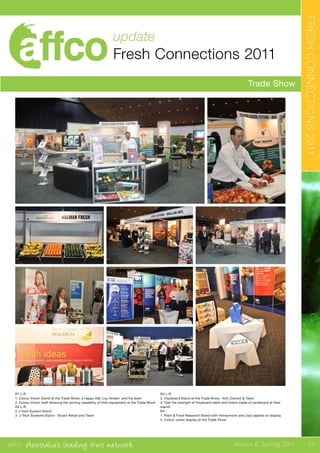
![affco Australia’s leading fruit network Winter & Spring 2011
update
Fresh Connections 2011
Key Retail Market Trends & Highlights | Conference
FRESHCONNECTIONS2011
Opening the doors to doing business
in Asia (China)
Raymond Jin, Managing Director, International Dept. Golden
Wing Mau Group (GWMG), China
Golden Wing Mau Group (GWMG) - established 13 years ago in
Hong Kong - is a major Chinese fruit wholesaler on 40 types of
fruits and operates 15 packing houses, 36 logistics centers and
1000+ super stores in 80 Chinese cities. This company could
be your potential China distributor and I encourage aspiring and
seasoned exporters to China to note salient market info and
insights I have captured below that may help you in your market
research or review your go-to-China-market strategies.
Mr. Jin is based in Shenzhen and has been with GWMG for 12
years.
• Guangzhou, Shanghai and Beijing wholesale markets
remain strong for sales to smaller towns.
• GWMG holds quota for Chinese fruit exports.
• GWMG is focused on Chinese retailers, which is the biggest
and most important channel in China.
• Dealing with retailers directly requires skills in dealing with
uncertainty (seems a global thing!).
• Supermarkets account for 15% of total fruit sales vs
advanced countries 70%, so there is room for expansion,
hence GWMG focus on retailers.
• Average fruit consumption in China is 46 kg per year vs 159
kg in EU => again potential for growth in fruit consumption
in China
• Market trend is towards larger players and distributors like
GWMG and supermarkets
• Import tariffs are decreasing and more protocols are being
agreed for fruit trade into China
- Australian cherries now signed. Imports into China
will be possible from this year (2011).
- Australian grapes 13% tariff vs Chilean grapes 5.5%
tariff
- Australian Government needs to work with Chinese
Government to reduce tariff to reduce the minimum
customs price, otherwise Australia will lose market
share to Chile.
• Chinese consumers aware of food safety and traceability.
• Important drivers for the Chinese retail market are as
follows:
- Country of origin
- Australia and New Zealand regarded as
clean, green and safe (high)
- Price, taste, quality, appearance and packaging
- Brand building (also referred by Martin
Kneebone as emerging trend for Australian
market)
- Chileans do not invest in any marketing whilst
Zespri has been investing in building their brands in
China and consequently after years of marketing
investments, commands twice the price of Chilean
kiwi fruit.
- [PLP note: Zespri is New Zealand’s single desk
kiwifruit marketer with NZ $1billion sales worldwide,
of which 92% of fruit are sourced from NZ. Their
branding strategies in Zespri Green, Zespri Gold and
Zespri Green Organic represent a useful successful
case study in a single desk approach to international
markets and strategic marketing, an approach I endorse after 26
years working experience in international markets].
David Ch’ng, Mosaic Consultancy
Those who attended AFFCO 2010 Leadership Development
Program would know David who led the Strategy and Innovation
session. David is a fantastic teacher who adopts wit and
historical information to bring to life salient points about Chinese
culture to help better understand Chinese culture as a precursor
to doing business successfully in Asia (China).
Raymond Jin and David Ch’ng’s presentations are available as
audio recordings on the Fresh Conmnections 2011 website.
Below are statistics on attendees
18
28.6%
11.9%
2.4%
13.5%
0.8%
3.1%
39.7%
CEO,
Owner,
Partner,
MD,
Director
General
manager,
CFO
OperaDons
Manager
Sales
Manager
Buyer
Salesperson,
RepresentaDve
Other
What
is
your
job
.tle?
8.7%
26.2%
0.0%
5.6%
8.7%
3.1%
3.2%
10.3%
15.1%
19.0%
Importer,
Exporter,
Broker
Grower
/
Packer
/
Processor
Trade
media
Government
Industry
OrganisaIon
PromoIonal
OrganisaIon
Retailer
Industry
Product/Service
Provider
Wholesaler
Other
Please
select
your
type
of
business
0%
5%
10%
15%
20%
25%
30%
<
$1
million
$1
–
10
million
$11
–
50
million
$51
–
100
million
Over
$100
million
Not
applicable
What
is
the
approx
gross
annual
turnover
(AUD)
of
your
company?
0%
5%
10%
15%
20%
25%
30%
35%
40%
Under
25
25
–
35
36
–
45
46
–
60
61
and
over
Please
select
your
age
range](https://image.slidesharecdn.com/530be2f8-2e44-45b7-99d9-26552b236aef-150623234516-lva1-app6892/85/AFFCO_NEWSLETTER_WINTERSPRING2011-25Oct11-Opt-19-320.jpg)
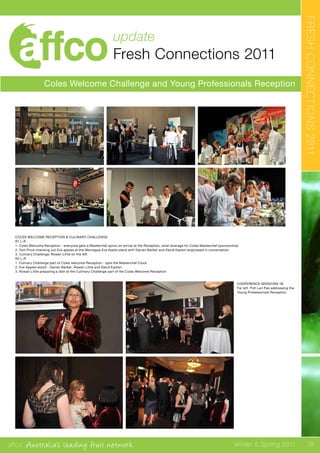
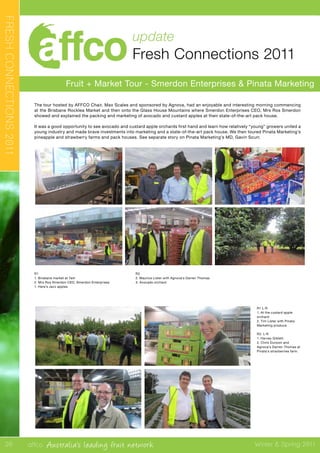
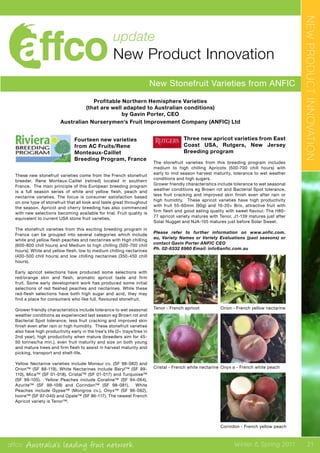
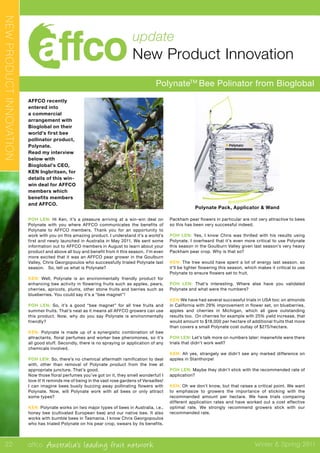
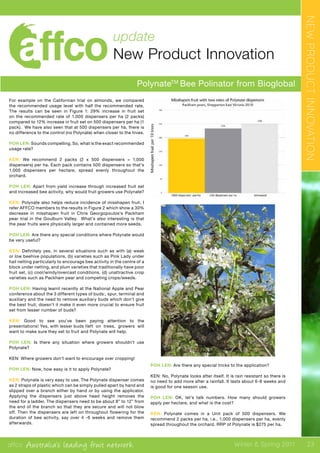
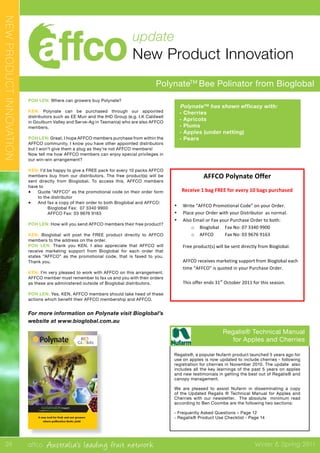
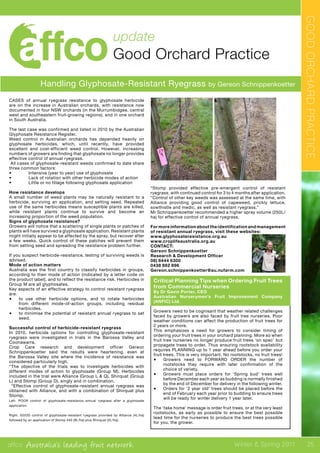
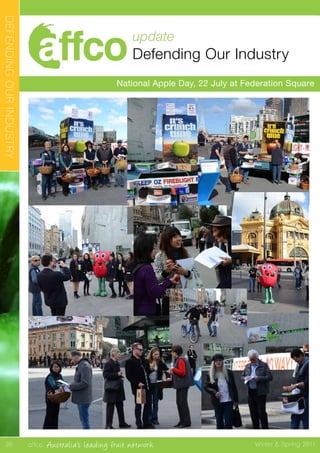
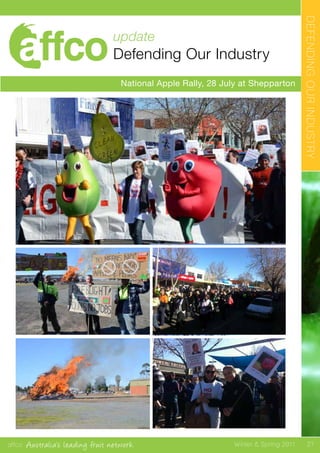
![affco Australia’s leading fruit network Winter & Spring 2011
update
Legal Learnings
Contractors vs Employees - It just got harder by Wisewould Mahony Lawyers
The recent Federal Court decision in the case of On Call
Interpreters and Translators Agency Pty Ltd v Commissioner
of Taxation (No 3) [2011] FCA 366 has more clearly defined the
distinction between contractors and employees, and in doing so
has highlighted the consequences for businesses that incorrectly
classify their workers as contractors.
The case concerned an appeal against an assessment by the
Commissioner of Taxation that On Call Interpreters and Translators
Agency Pty Ltd (On Call) was liable to pay superannuation in
respect of interpreters and translators that On Call had classified
as ‘contractors’. The key issue to be decided by Justice Bromberg
was whether the interpreters and translators were ‘employees’ for
the purposes of the Superannuation Guarantee (Administration)
Act 1992 (Cth).
The Test
Viewed as a “practical matter”:
(i) is the person performing the work an entrepreneur who owns
and operates a business; and,
(ii) in performing the work, is that person working in and for that
person’s business as a representative of that business and not
of the business receiving the work?
If the answer to that question is yes, in the performance of
that particular work, the person is likely to be an independent
contractor. If no, then the person is likely to be an employee.
First Element – Does the worker own and operate a business?
Bromberg J set out a number of questions to determine whether
the worker “owns and operates a business”, which are summarised
below:
• Does the “business” involve the taking of risk in the pursuit
of profits?
• Does the “business” engage in a repetitive and continuous
manner with purchasers of its services?
• Does the “business” employ or engage others?
• Does the “business possess or create goodwill (name, brand
and reputation)?
• Is the “business” promoted through advertising or other
promotional means?
• Does “business” have assets such as buildings and
equipment?
• Does the “business” have typical business systems (e.g
invoicing systems; standard terms and conditions of trade;
financial arrangements with banks) and does it comply with
the regulatory requirements of a business?
• Is the service provided of sufficient skill to be suggestive of
the pursuance of a profession or trade through a business?
Whilst many of the interpreters had multiple purchasers of their
services, they did not meet satisfy the other criteria of “contractors”.
All of the interpreters performed the work personally, and did
not delegate to others; there was no advertising or promotion of
their “businesses”; there was no goodwill created; none of the
interpreters bore business risk nor did they take out personal
indemnity insurance to cover risk; and, significantly, most of the
interpreters simply accepted the rates of pay offered by On Call
without bargaining.
Second Element – Whose business is the work being
performed in?
Whilst a worker may own and operate a business, they may still be
an employee if performing the work for and on behalf of another
business (“the receiving business”).
Bromberg J considered a number of factors which go towards
demonstrating whose business the work is being performed in.
• Does the worker’s business or the receiving business benefit
from the opportunity for profit and goodwill, and which
business bears the risk of loss?
• Is the payment made equivalent to what an employee would
have received for performing the same work?
• Is the payment negotiable and negotiated commercially, and
to what extent is the payment contingent upon the person
providing a satisfactory result?
• Which party has the capacity to manage the activity so as to
maximise the potential for profit?
• Who provides the equipment or assets required?
• Who controls and directs the manner in which the work is
carried out?
• Can the person performing the work delegate or must that
person personally perform the work?
• To whose business does any goodwill created by the
economic activity enure?
In short, if the receiving business provides the tools; controls
the work; sets the rates of pay; and takes the risk and reward of
the business activity, then it will be found that the work is being
performed in the receiving business.
Summary
The above listed factors are not exhaustive of all the factors set out
by Bromberg J, however they give a good sense of the message
conveyed in the decision. The decision is that the latest in a series
of cases that have made it increasingly difficult for businesses to
engage workers as contractors, including the recent high profile
decision in Roy Morgan Research Pty Ltd v Commissioner of
Taxation [2010] FCAFC 52.
Many businesses engage workers under the label “contractor” in
circumstances were those workers bear no risk; must perform the
work personally; have no bargaining power; and are directed in
how they must perform the work. Bromberg’s ruling is an emphatic
statement that such people are employees and will be treated
accordingly by the law.
Consequences of incorrectly classifying an employee
The financial consequences for businesses that incorrectly
classify employees as contractors extend far beyond having to
make superannuation contributions.
Businesses will be exposed to the following additional adverse
consequences:
• unfair dismissal claims;
• claims for entitlements, including annual leave, personal/
carer’s leave,parental leave and long service leave;
• civil penalties from the Workplace Ombudsman for breaches
of awards and/or the Fair Work Act 2009 (up to $33,000 per
breach for a company);
• prosecution or civil action under the sham contracting
provisions of the Fair Work Act 2009;
• claims in negligence for damage suffered by third parties;
and consequences under Occupational Health & Safety
LEGALLEARNINGS
28](https://image.slidesharecdn.com/530be2f8-2e44-45b7-99d9-26552b236aef-150623234516-lva1-app6892/85/AFFCO_NEWSLETTER_WINTERSPRING2011-25Oct11-Opt-29-320.jpg)

